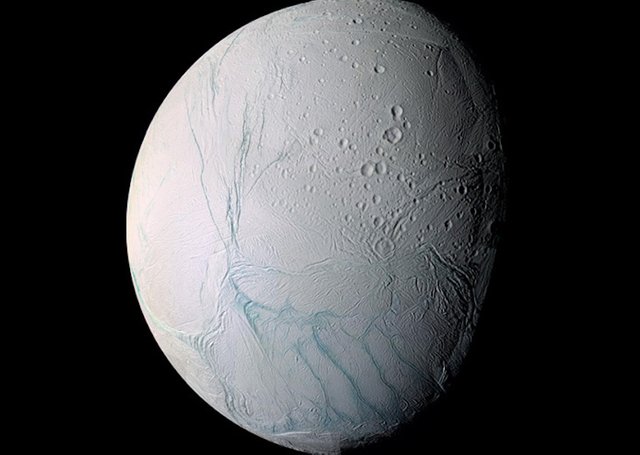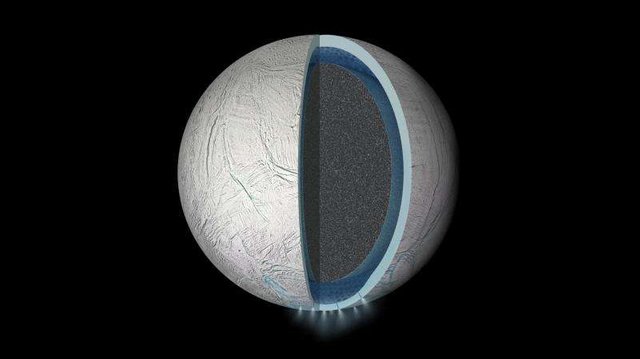Hidden oceans on Saturn's moon Dion
Hydrogen and oxygen are some of the most common elements in the universe. As many people know, two hydrogen atoms and one oxygen atoms make up a water molecule. Because of the abundance of oxygen and hydrogen water is one of the most common molecules in the universe. We see it practically every day here on Earth and astronomers see it quite often as well in the night sky, but most of the time it is either vapor or solid, it is not as easy to find liquid water though.
It has been know that some of the moons in our solar system, though frigid and lacking a substantial atmosphere have a liquid ocean hiding under their surface. Some of these bodies include ones around Saturn such as: Titan, Encdladus, but a new one may be added to that list soon. That moon is Dione.
back in October of 1997 a probe was sent out on a path towards Saturn. It arrived and sent back valuable data allowing researchers to find that there is water on two of Saturn's moons deep below the surface. On it's mission it also happened to find another body that could possibly have liquid water as well. This moon was named Dione, and not just some water, but vast oceans that span the entire moon, just deep bellow the surface.
About Dione's oceans
100 km bellow the surface of Dione there lies an ocean that is 10's of km thick and completely encases a rocky core. This allows for the entire surface of the moon to glide across the top like a sponge on water. Enceladus shoots magnificent jets of water into space from it's South poll area. Dione though is dormant without much surface activity, but the cracks on its surface suggest violent events like the ones that happen on Enceladus just at a different time.
When the chances of liquid water became apparent on Enceladus scientists seized the moment to learn all that they could. It was found that the crust of Enceladus was extremely thick and no subsurface oceans for Dione. It was also well noted that a crust that floats on an ocean of water could only take a minimum amount of stress and strain that was needed keep the surface, and if it was more it would destroy the crust breaking it into pieces. The idea was changed though with the findings of the Cassini mission. It would need to be confirmed using another orbiter though, to get even more accurate data.
Implications:
The prospect of liquid water outside planet Earth is exciting for most people, but it gets nobody more excited than an astrobiologist. An astrobiologist has the difficult job of studying the origin of life and the possibility of life on other planets.
One of the most important things for life to exist is liquid water. With the discovery of liquid water around the core of Saturn's moons there is the possibility of life under the surface. This is because the liquid water will erode at the core and circulate essential nutrients in the oceans and create a churn for life. It is a small possibility but if there is a chance for life to live beyond Earth Scientists above all others would like to find and they will do all they can to find it.
Sources:
solarsystem.nasa.gov/images/content/enceladusstripes_6962.jpg
cdn.phys.org/newman/csz/news/800/2016/2-saturnsmoond.jpg
thescienceexplorer.com/universe/saturn-s-moon-dione-has-subsurface-ocean


Isn't H2O2 hydrogen peroxide, not water?
was a typo, fixed it. Also, yes H2O2 is hydrogen peroxide.
I really hate to say this, but you changed it wrong. Two hydrogen atoms and one oxygen atom.
omg. okay, now it's fixed. XD